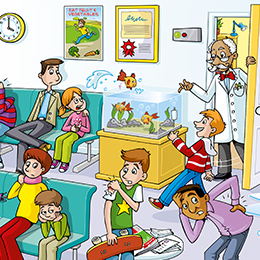Technology is changing our world. Routine knowledge and skills are being automated, digitised and outsourced.
Universities, governments and businesses from around the world have worked together to understand the skills that children will need to succeed in the 21st century.
Collaboration
Learning how to work effectively and respectfully with other people is an important life skill. Collaborative activities are also excellent for English language learners because they encourage speaking and listening skills.
Learning tip
Put books, chairs and other objects in places where people might bump into them. Choose one family member to walk through the obstacle course while blindfolded.
Ask another family member to guide them through the obstacle course, by saying directions in English (e.g. left, right, stop, take one step back).
Responsibility
Responsibility is about encouraging children to make a difference to the world in which they live. Children learn that they can inspire and motivate others when they lead by example.
Learning tip
Ask your child to be responsible for teaching another family member some English. For example, this might involve teaching them three new English words a day and testing them at the end of each week.
This is a great activity for language learners. Teaching someone else is one of the best ways to learn.
Critical thinking
Critical thinking is about having logical reasons and evidence for your conclusions. It is an important skill in academic subjects and for everyday decision-making.
Learning tip for 5–12 year olds
Look at some pictures together. For example, here’s a picture called At the doctor’s. Try using a mixture of closed questions, which assess quick facts (e.g. Where is the doctor?), and open questions, which assess reasoning (e.g. Why do you think the doctor is looking surprised?).

Learning tip for 13–18 year olds
Encourage your child to read texts with different people’s opinions, such as newspaper or magazine articles. Ask your child to question what they read. What are the facts? What are the opinions? Does the author give any evidence to support their opinions?
Creativity
We often focus on analytical, logical thinking. However, imaginative and creative thinking – the process of playing with ideas and being open to new possibilities – has been just as important in the history of human development and achievement.
Learning tip
Ask your child to design their dream home, car, clothes or toy and label some of the parts.
Problem-solving
We all face problems every day at school, at work and at home. To solve problems, we need to think in both analytical and creative ways. We also need to develop resilience – the ability to handle a challenge, deal with pressure and persist until a problem is resolved.
Learning tip
Find a funny short story. Cut it up and ask your child to use sticky tape to stick it back together again. You can make it more difficult by having a couple of cards that don’t match so the task isn’t completed by luck towards the end.
Initiative and self-direction
Self-direction is about having the motivation to achieve and the discipline to complete tasks to a deadline. Research has found that initiative is even more important for academic success than intelligence.
Learning tip
Let your child take part in choosing what to do. For example, choose English books together at the library. This will help with motivation, as they can pick topics/characters they are interested in.
ICT and information literacy
Children today have access to so many different technologies and so much information. It’s important to teach them how to make the most of it.
Learning tip
Check out our digital learning tips in our article: Practising English using digital technology.